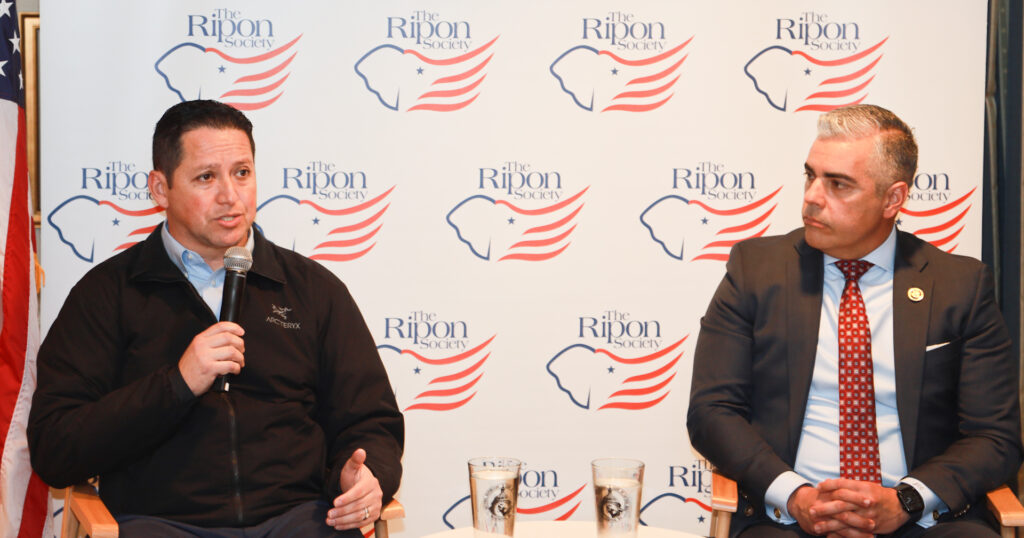
“The things that happen here at home absolutely impact the world.”
WASHINGTON, DC – The Ripon Society hosted a dinner discussion this past Tuesday evening with two leaders of Congress who, because of their subcommittee assignments and districts, are at the forefront of the effort to secure America’s southern border and put in place an immigration system that serves the American people the best.
The leaders are Tony Gonzales and Juan Ciscomani. Gonzales was elected in 2020 and represents the 23rd District of Texas in the U.S. House of Representatives. Ciscomani was elected in 2022 and represents the 6th Congressional District of Arizona. Both represent districts that are located along the southern border. Both also serve on the Homeland Security Appropriations Subcommittee, which has made border security one of its top priorities this year.
Gonzales – who spent over 20 years serving in the Navy before his election to Congress – spoke first about the issue, kicking off the discussion by talking about a visit he just made with the Sergeant Major of the Army, and how the actions Congress and the President take to secure our southern border have a ripple effect on both American allies and interests around the globe.
“The things that happen here at home absolutely impact the world,” Gonzales stated. “We’re asking 10,000 soldiers to go to the Southwest border instead of Europe. That impacts readiness. Our allies are asking, ‘What’s going on here? What’s the long-term plan?’ That gets very complicated, very quickly. What I will say, though, is you’re seeing our partners across the world understand that the deck has changed. There’s a new administration and there needs to be a new dialogue. And I think a big part of making sure that we are successful in this is having that dialogue.”
“Juan and I both represent areas along the border, and you need to have that constant dialogue. The border crisis has essentially come to an end very quickly, overnight. The numbers have plummeted, but it’s going to take years in order to tackle some of these issues. And it is going to be costly.”
Ciscomani – who was born in Mexico and is the first naturalized American citizen from Mexico elected to the U.S. House in Arizona history – agreed, and opened his remarks by discussing how he approaches the issue of border security.

“I always talk about three buckets when we talk about the border because there are different aspects of the border,” he stated. “Are we talking about border security? Are we talking about trade and commerce? Or are we talking about immigration policy? In my mind, these are three separate buckets that people in Washington or the elected officials from around the country who are not from border districts sometimes don’t really understand. And people tend to look at it from one lens only.”
“I’m an immigrant, so I have an immigrant background. I know that process. It took my family 13 years to become U.S. citizens. And I’ll tell you, there has to be a better process for that. It can’t take that long, right? This is where the work visa can get done. This is where DACA students deserve a shot at the American dream. This is all the immigration part of it. And then we’ve got trade and commerce for Arizona and for Texas and for the U.S. Mexico is your number one trading partner. So when you have these conversations around tariffs, it has a direct impact on the local economy as it does on security.”
Following their opening remarks, Gonzales and Ciscomani took a number of questions, including one about representing border districts and why it is important for other Americans – and other members of Congress – to understand the unique challenges facing the people they represent.
“Most people have never been to the southern border,” Gonzales observed. “They don’t know what that means. All they know is what they see on TV or what they hear about. It is very complex. If you live there, you get it, you understand. It isn’t foreign to go over to Mexico for a doctor’s appointment or the dentist. It isn’t foreign to have someone from Mexico come over and go to your school or your church or whatever it may be. That isn’t foreign. It’s natural if you live there. But there are so few of us who understand that. For everyone else, it’s easy to spew the rhetoric or the talking points.”
Ciscomani concurred, and said he plans to host a trip to the border for new Republican members of Congress so they can better understand the situation on the ground.
“We want to start this as a tradition where we invite a group of freshmen Republicans to the border and show them what the border is like,” the Arizona lawmaker stated. “And we’re going to cover the three buckets so that they can understand that there’s a trade component that is huge for their states. It’s a trade aspect. It’s a cultural aspect. It’s immigration. It’s also security. It’s how it all plays into each one of our states. We’re going to be doing that with every freshman class so that they can be exposed to that and understand it better. We’ve got to share the knowledge.”
To view the remarks of Gonzales and Ciscomani before The Ripon Society Tuesday evening, please click the link below:
The Ripon Society is a public policy organization that was founded in 1962 and takes its name from the town where the Republican Party was born in 1854 – Ripon, Wisconsin. One of the main goals of The Ripon Society is to promote the ideas and principles that have made America great and contributed to the GOP’s success. These ideas include keeping our nation secure, keeping taxes low and having a federal government that is smaller, smarter and more accountable to the people.



